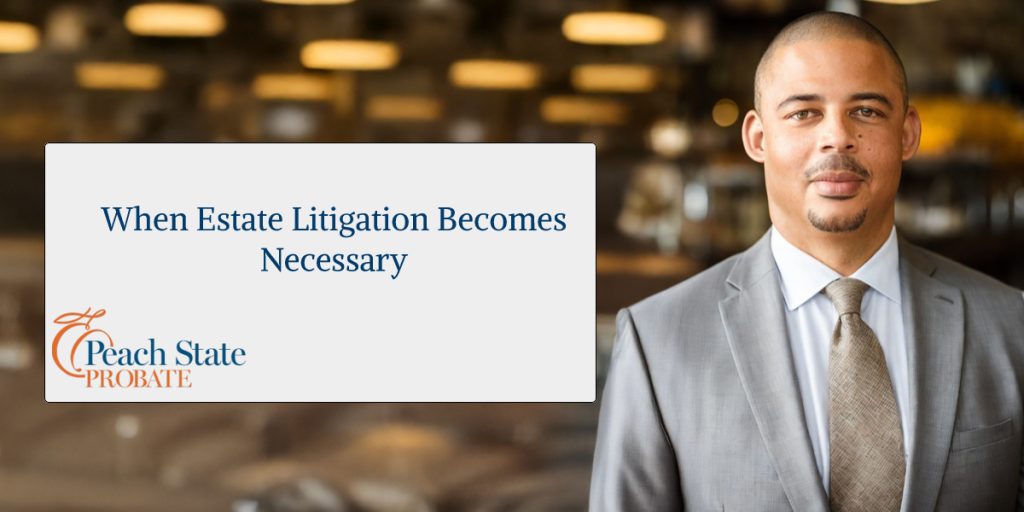## Understanding the Need for Estate Litigation
Estate litigation becomes a crucial consideration for many individuals and families navigating the complexities of wills and trusts. It addresses disputes arising from the interpretation of estate documents, the validity of wills, the distribution of assets, and more. While most people prefer to settle their estate affairs amicably, sometimes disagreements escalate, warranting legal intervention. Recognizing the signs that estate litigation may be necessary can prevent further conflict and ultimately lead to a resolution that honors the decedent’s wishes and preserves familial relationships.
When estate litigation springs to mind, the urgency often arises from issues such as will contests, breaches of fiduciary duty, or disagreements over asset distribution. Understanding this legal landscape is critical for anyone involved in a probate situation. Not only does it help parties identify when legal action is necessary, but it also prepares them for how to effectively navigate the legal system if disputes arise. Properly addressing these matters can significantly impact the outcome and the well-being of those involved.
Ultimately, knowing when estate litigation is necessary can provide clarity and guide families in making informed decisions that reflect the intent of the deceased while fostering open communication and resolution among heirs.
## Defining Estate Litigation
Estate litigation is a specialized form of legal action that arises concerning the management and distribution of a deceased person’s assets. This type of litigation addresses disputes around wills, trusts, and other elements of estate planning and management. The need for estate litigation can bring various complexities to the forefront, such as potential fraud, undue influence, misinterpretation of documents, and disagreements among heirs or beneficiaries.
Various scenarios may necessitate estate litigation. For example, when a family member challenges the validity of a will or claims that the decedent was under duress at the time of its signing, these can lead to lengthy court battles. Similarly, if an executor is accused of mismanaging estate assets or failing to act according to the deceased’s wishes, beneficiaries or other interested parties may seek legal remedies. Given these potential conflicts, it is essential for anyone involved in an estate process to understand the implications of estate litigation.
This litigious avenue is not reserved for high-profile estates or wealthy beneficiaries alone; even simple estates can find themselves embroiled in disputes necessitating estate litigation. Thus, it is vital for heirs and beneficiaries to grasp the intricacies of the situation they face.
## Importance of Addressing Estate Litigation
Understanding the implications of estate litigation is critical as it affects not only the assets involved but also the relationships among family members and beneficiaries. Failing to adequately address potential disputes can lead to prolonged legal battles, significant financial burdens, and emotional distress. The sooner individuals recognize when litigation enters the sphere of estate planning, the more equipped they are to find effective resolutions that uphold the decedent’s wishes.
Moreover, the significance of estate litigation extends to maintaining the integrity of the estate planning process itself. Clarity, transparency, and open communication are vital components of successful estate management. However, when disputes arise, these elements can quickly deteriorate, resulting in fractured relationships and distress among family members. Legal intervention may become necessary to restore clarity and foster cooperation.
In essence, understanding estate litigation’s role not only supports efficient conflict resolution but also encourages families to address underlying issues constructively, ultimately preventing further discord.
## The Legal Framework Surrounding Estate Litigation
The legal framework governing estate litigation varies based on the jurisdiction and the specific nature of the dispute. Typically, estate litigation falls under state laws pertaining to probate and trust administrations. In Georgia, these laws define the processes for contesting a will, handling breaches of fiduciary duty, and resolving disputes about asset distribution. Familiarizing oneself with this framework can greatly influence how a case is approached and resolved.
One important aspect of the legal framework is the requirement for standing, meaning that only certain individuals have the legal right to initiate litigation. This often includes heirs, beneficiaries, and executors or administrators of the estate. The courts set strict rules on the timeliness of filing claims, and failure to comply can lead to dismissal. Additionally, the burden of proof may rest heavily on claimants, requiring them to present substantial evidence to support their case.
Moreover, where litigation escalates, the realities of discovery, evidence presentation, and court appearances become increasingly critical. Engaging in estate litigation without a comprehensive understanding of the legal framework can prove detrimental, emphasizing the need for informed representation and guidance throughout the legal process.
## Real-Life Scenarios of Estate Litigation
Real-world examples of estate litigation can illustrate the complexities and challenges families often face. Consider a case where a decedent leaves behind a will, but one of the heirs claims that it was signed under undue influence from another family member. In this situation, the heir may contest the will, escalating the matter into a full-fledged lawsuit that examines the decedent’s mental capacity and the relationships among family members. Such cases can reveal underlying tensions and lead to protracted court battles.
Another common scenario occurs when executors fail to perform their fiduciary duties, such as improperly managing estate assets or failing to provide accurate accounting to beneficiaries. This breach of fiduciary duty can lead to claims from beneficiaries who feel entitled to a fair and transparent distribution process. When disputes arise, beneficiaries may seek legal recourse, resulting in estate litigation that examines the executor’s actions and decisions during the estate administration process.
Additionally, trust disputes can also spark estate litigation. For instance, if a trustee is alleged to have mismanaged funds or acted against the best interests of the beneficiaries, beneficiaries may challenge the trustee’s actions in court. These cases highlight the importance of understanding the roles and responsibilities of individuals involved in estate management and how breaches can have significant legal ramifications.
## Proactive Steps to Consider
Taking proactive steps can significantly mitigate the risks associated with estate litigation. The most effective approach begins with clear and comprehensive estate planning. Engaging with professionals who understand the nuances of estate law and ensuring that documents accurately reflect intentions can prevent many misunderstandings. Documenting discussions among family members about the distribution of assets can also provide clarity and serve as evidence if disputes arise.
Furthermore, maintaining open lines of communication among family members is vital. When everyone involved understands the decedent’s wishes and the reasoning behind estate decisions, it lessens the likelihood of disputes. Family discussions about wills, trusts, and asset distribution, held before the death of a loved one, can go a long way in fostering understanding and cooperation.
Lastly, staying informed about the nuances of estate laws in Georgia and any changes prompted by legislative updates can help families navigate potential pitfalls more effectively. A commitment to understanding estate issues proactively prepares families for unforeseen challenges that may require legal attention and ultimately supports smoother estate resolution processes.
## Common Pitfalls in Estate Litigation
While navigating estate litigation, individuals often encounter common mistakes that can complicate or derail their cases. Failing to thoroughly review the pertinent documents is one such pitfall. Whether the estate planning documents or the relevant statutes and regulations, overlooking details can lead to misinterpretation and ineffective legal strategies. It’s crucial to read and understand every detail to avoid falling prey to misunderstandings or inaccuracies.
Another common mistake is miscommunicating with counsel. Clear communication with legal representatives ensures that case strategies are effectively aligned with clients’ needs and circumstances. Conversely, failing to convey concerns or changes in circumstances can hinder the legal process and may lead to unfavorable outcomes. Active collaboration with legal counsel is essential to address evolving situations and implement effective strategies.
In addition to these issues, individuals often underestimate the emotional impact of litigation. Estate disputes can be particularly stressful and may exacerbate existing family tensions. Ignoring the emotional aspects can lead to rash decisions or a breakdown of communication among family members. Recognizing the emotional toll of estate litigation is essential in order to manage stress and focus on resolution.
## Knowing When to Seek Legal Assistance
Recognizing the right moment to consult an attorney is critical in estate litigation. Individuals should not hesitate to seek legal counsel when they anticipate or encounter disputes over estate distribution, will validity, or the actions of executors or trustees. Early intervention can streamline the process and resolve issues before they escalate into prolonged litigation, ultimately safeguarding family relationships and financial interests.
Additionally, legal counsel becomes paramount when dealing with complex assets, such as businesses, real estate, or large estates. Understanding how these assets are treated under the law may require specialized knowledge and guidance. An attorney well-versed in estate litigation can provide invaluable insights to navigate these complexities, ensuring that all matters are handled efficiently and in compliance with legal standards.
Finally, family dynamics and emotional considerations should not be overlooked when determining the need for legal representation. If discussions among family members become heated or fraught with disagreement, seeking legal counsel can facilitate communication and lead to more constructive outcomes. Engaging an attorney can help parties focus on resolutions rather than conflicts, ultimately preserving family relationships during challenging times.
## Advantages of Professional Legal Representation
The benefits of obtaining legal representation during estate litigation are multi-faceted and significant. Firstly, an attorney brings a deep understanding of estate law, personalizing the approach to address the unique circumstances of each case. They can provide crucial insights into applying relevant statutes, managing filings, and executing legal strategies that align with a client’s interests, which is invaluable when disputes arise.
Secondly, representation enhances the efficiency of legal procedures. With a clear understanding of court processes and protocols, an attorney can navigate the complexities of estate litigation more effectively. They can also facilitate negotiations, mediate disputes before they head to court, and seek alternative resolutions such as mediation or arbitration—often leading to less financially burdensome and emotionally taxing outcomes.
Lastly, having professional guidance alleviates the stress associated with estate disputes. Legal representatives act as advocates for their clients, allowing individuals to focus on personal matters rather than becoming consumed by legal intricacies. This support can also help families cope with the emotional toll of litigation, providing a sense of clarity and direction during turbulent times.
## Leveraging Peach State Probate for Your Estate Needs
Peach State Probate stands out as a premier choice for those navigating the intricacies of estate litigation in Georgia. Their dedicated team of seasoned professionals understands the emotional weight of estate disputes and approaches each case with compassion and diligence. With a focus on clear communication, they ensure that clients remain informed at every stage of the legal process, fostering a sense of trust and confidence.
The firm’s extensive knowledge of Georgia’s probate laws equips them to tackle a wide variety of estate litigation challenges effectively. Whether dealing with complex will contests, fiduciary breaches, or trust disputes, Peach State Probate offers tailored legal strategies that prioritize the interests of their clients. Their reputation for excellence and dedication to achieving favorable outcomes for clients makes them an exceptional partner during challenging times.
Ultimately, choosing Peach State Probate means accessing top-tier legal support rooted in empathy, expertise, and an unwavering commitment to client success. Their holistic approach to estate litigation not only seeks favorable resolutions but also works to preserve family dynamics during disputes.




